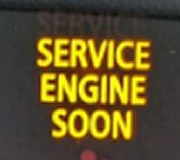This may help its from
converters. Com
Tech Tips How do I know if my catalytic converter is defective?
How do I know if my catalytic converter is defective?
Catalytic converters are defective when they become clogged or poisoned. You may sometimes be able to feel when a converter is partially clogged, or defective, when you do not go any faster when you step on the throttle. This may also be accompanied with a noticeable drop in gas mileage. A clogged converter will cause increased backpressure in the exhaust system. This increased backpressure prevents the engine from breathing properly which in turn may cause the engine to quit after a few minutes of driving or feel like an engine governor limiting the RPM's the engine can achieve. You may actually hear a whistling or choking sound when applying the throttle.
A catalyst that has broken apart internally and is loose in the system or has worked its way back to the muffler can also cause rattling noises. This rattling may be prevalent at idle but go away as speed is increased. Sometimes you may tap on the converter with a rubber mallet and hear the core rattling. If you discover any of the above your converter needs to be replaced.
Since there is no inspection port for you to see if you have an actual clog in a converter there a couple things you may try to help diagnose a defective converter. Many mechanics will remove the oxygen sensor and look for a change in the vehicles performance. If a performance change is noted, your converter needs to be replaced. You must be extremely careful if you run the engine with the oxygen sensor removed since there is a risk of fire and asphyxiation caused by escaping engine exhaust and exhaust gases.
A vacuum gauge that also has a fuel pressure gauge, or a pressure gauge that has a 1 to 10 pound scale, may also assist you in diagnosing a clogged exhaust.
If you connect the gauge upstream of the converter, either in an emission test port or by fashioning an adapter in the oxygen sensor hole, you can measure the exhaust backpressure. A general rule of thumb is no more than 1.5 pounds of backpressure. Another test, using a vacuum gauge, is to measure the engine vacuum at curb idle and at 1600 RPM. If engine vacuum is 21 inches at curb idle and 15 inches at 1600 RPM then there is a good possibility your catalytic converter needs to be replaced.
You may also take the converter off the vehicle and check it for damage or clogging. Shining a flashlight into the core of a honeycomb style converter will reveal whether the honeycomb is partially clogged, damaged, or loose from the edges.
Finally, a converter can be defective because it has become poisoned. When a catalytic converter becomes poisoned it loses its ability to effectively control emissions. Some common causes for poisoning and converter degradation are using leaded fuel, fuel additives containing lead, an out of tune engine, engine management system failure, faulty engine sensors, just to name a few.
If your vehicle is burning an excessive amount of fuel or misfiring, due to some of the reasons above, it is just a matter of time before converter failure. A constant rotten egg smell emitting from the tailpipe is a sure sign of the impending failure of your converter.
If you do determine that your catalytic converter is defective, it is extremely important that you determine the reason for its demise. Always have your emissions checked on an exhaust gas analyzer after the new converter is installed to ensure your engine and engine management systems are operating at their peak efficiency. Failure to find and repair any fault will result in a premature failure of your new converter.
Monday, November 8th, 2010 AT 5:52 PM





